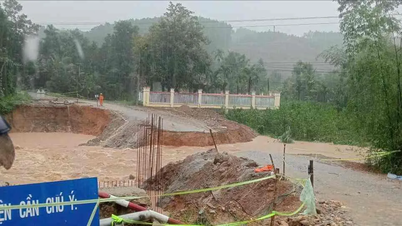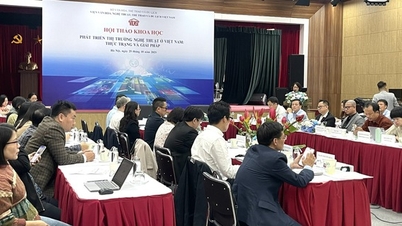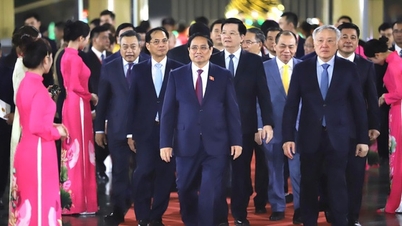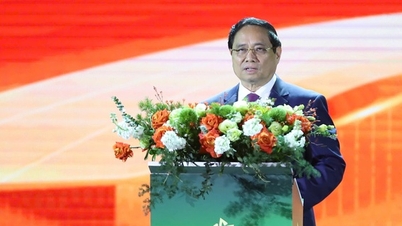.jpg)
The socio -economic situation in the first eight months of 2025 achieved many positive results in most areas, reflected in the continued stability of macroeconomic indicators, the major balances of the economy being ensured, growth being promoted, and inflation well controlled.
Public investment is the key driving force
According to the General Statistics Office, in the first eight months of 2025, the industrial production index (IIP) is estimated to increase by 8.5% over the same period last year and in all 34 localities. Notably, the business development situation continues to improve when the whole country has more than 209,000 newly registered and resuming operations, up 24.5% over the same period; on average, 26,200 newly established and resuming operations per month, while the number of businesses withdrawing from the market is 20,100. State budget revenue reached more than 1.74 million billion VND, equal to 88.5% of the year's estimate and up 28.5% over the same period; total state budget expenditure reached 1.45 million billion VND, equal to 56.3% of the year's estimate and up 31.5%.
Traditional growth drivers continued to be promoted and renewed with total retail sales of goods and consumer service revenue increasing by 9.4% over the same period, reflecting strong growth in domestic purchasing power. Total import-export turnover reached 597.93 billion USD, up 16.3%, with a trade surplus of nearly 14 billion USD. The average consumer price index for the first eight months increased by 3.25%.
In the context of the whole country implementing the two-level local government model, public investment activities still have positive results with a disbursement volume of VND 410,000 billion, an increase of about VND 135,000 billion over the same period. Deputy Minister of Finance Tran Quoc Phuong commented that the disbursement of public investment capital from the beginning of the year to now is higher than previous years in both absolute numbers and disbursement speed, reaching 49% of the plan assigned by the Prime Minister at the beginning of the year and 46.3% of the plan assigned by the Prime Minister. This is a very positive result in the context of the whole country resolutely implementing the apparatus arrangement and implementing the two-level local government model.
However, to achieve the target of disbursing 100% of public investment capital with the capital volume assigned up to 1 quadrillion VND this year, ministries, branches and localities are facing many challenges; focusing on major issues such as capital allocation, restructuring the two-level local government apparatus; perfecting legal institutions; and organizing project implementation.
Currently, about 38,500 billion VND of central budget capital has not been allocated because many projects do not have enough procedures or need to be re-evaluated when merging and consolidating administrative agencies. The Ministry of Finance is building a "handbook" based on a collection of documents guiding the disbursement of public investment capital so that localities can proactively and uniformly implement it, without having to send documents to ask management agencies as before.
The Government has identified public investment disbursement as a key driving force to lead and spread social resources. In Official Dispatch No. 159/CD-TTg of the Prime Minister on the direction and management of fiscal and monetary policies, the Prime Minister requested the Ministry of Finance to effectively advise the Prime Minister's Working Groups to urge and promote the disbursement of 100% of public investment capital in ministries, branches and localities; propose breakthrough and specific solutions to accelerate disbursement in the last months of the year, especially for ministries, branches and localities assigned with large capital plans.
The Prime Minister also requested ministries, branches and localities to more resolutely, strongly and effectively implement tasks and solutions to promote disbursement of public investment capital; focus on accelerating the progress of key infrastructure projects in the fields of energy, transport, health care and education; strive to achieve a minimum disbursement rate of about 60% of the plan by the end of the third quarter of 2025.
Maintaining macroeconomic stability
According to the Ministry of Finance, in the last months of the year, it is necessary to resolutely and synchronously deploy many solutions to meet growth requirements; in which, focusing on urgently completing the projects assigned by the Politburo on economic development; resolutely and effectively implementing Conclusion 186-KL/TW of the Politburo and the Secretariat on the situation and performance results of the political system apparatus and two-level local authorities, especially tasks with a deadline of completion in September 2025 to promptly remove difficulties and obstacles in practice. In addition, the completion of institutions and laws, and improvement of the investment and business environment need to continue to be strongly implemented; boosting exports; promoting and renewing traditional growth drivers along with developing new growth drivers.
The Ministry of Finance also emphasized the need to focus on maintaining macroeconomic stability and controlling inflation in the final months of the year. This was also the content discussed by economic experts at the recent Expert Consultation on the Socio-Economic Situation organized by the National Assembly's Economic and Financial Committee.
To achieve the growth target of 8% in 2025 and double-digit growth in the following years, Associate Professor, Dr. Pham The Anh, Head of the Faculty of Economics, National Economics University, recommended: Vietnam needs to have appropriate macroeconomic policies to promote internal strength, minimize risks from macroeconomic instability and geopolitical tensions in the world.
Accordingly, fiscal policy should aim at the highest goal of promoting long-term growth and ensuring the sustainability of public debt. For monetary policy, the inflation target must be prioritized; controlling the growth rate of money supply must be consistent with the growth target and controlling inflation. Fiscal and monetary policies must be implemented according to transparent and predictable rules so that businesses and people can make long-term decisions.
Vietnam needs to have appropriate macroeconomic policies to promote internal strength and minimize risks from macroeconomic instability and geopolitical tensions in the world.
Associate Professor, Dr. Pham The Anh, Head of Faculty of Economics, National Economics University
Sharing the same view, Professor, Dr. Tran Tho Dat, Chairman of the Science and Training Council, National Economics University, said that the current domestic and international situation requires Vietnam to be cautious in management and steadfast in the goal of macroeconomic stability. All growth support policies must be based on the foundation of macroeconomic stability, ensuring market discipline, improving labor productivity and capital efficiency.
Fiscal and monetary policies need to focus on implementing short-term solutions to maintain liquidity, control inflation and direct credit to priority areas, while persisting with medium- and long-term goals so that the financial system can truly become a driving force for rapid and sustainable growth.
Source: https://baolamdong.vn/don-suc-cho-tang-truong-kinh-te-cuoi-nam-390596.html





![[Photo] Prime Minister Pham Minh Chinh and United Nations Secretary-General Antonio Guterres attend the Press Conference of the Hanoi Convention Signing Ceremony](https://vphoto.vietnam.vn/thumb/1200x675/vietnam/resource/IMAGE/2025/10/25/1761391413866_conguoctt-jpg.webp)
![[Photo] General Secretary To Lam received the delegation attending the international conference on Vietnam studies](https://vphoto.vietnam.vn/thumb/1200x675/vietnam/resource/IMAGE/2025/10/26/1761456527874_a1-bnd-5260-7947-jpg.webp)
![[Photo] Prime Minister Pham Minh Chinh attends the opening of the 47th ASEAN Summit](https://vphoto.vietnam.vn/thumb/1200x675/vietnam/resource/IMAGE/2025/10/26/1761452925332_c2a-jpg.webp)































![[Photo] National Assembly Chairman Tran Thanh Man receives United Nations Secretary-General Antonio Guterres](https://vphoto.vietnam.vn/thumb/1200x675/vietnam/resource/IMAGE/2025/10/25/1761390815792_ctqh-jpg.webp)






































































Comment (0)